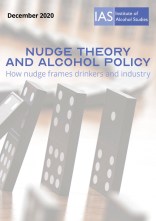02 December 2020 – Institute for Alcohol Studies
The public are ‘blameworthy’ for their own alcohol-related health issues, according to a new IAS repor t looking into how the public health initiatives use nudge theory’s principles to frame actions and attitudes.
t looking into how the public health initiatives use nudge theory’s principles to frame actions and attitudes.
‘Nudge theory and alcohol policy – how nudge frames drinkers and industry’ also found alcohol industry actors were framed as ‘reliable’, with any who engage in behaviour harmful to public health described as outliers.
The report concludes that such framing risks intensifying the clouding of economic or societal drivers of public health problems through nudge policies, as identified in prior research, and might undermine support for better evidenced public health alcohol measures, such as pricing interventions.
NUDGE THEORY AND ALCOHOL POLICY
This IAS’ new report dives into how people’s actions and attitudes are framed by the way public health initiatives use nudge’s theory principles.
The case of the U.K.: between the 2017 and 2019 Conservative governments, many policy activities came into place in regard to alcohol and public health. Both existing and newly policy activities were also outlined in the 2019 green paperAdvancing out health: prevention in the 2020s. This one done through
– the Public Health England’s One You campaign
– the inclusion of alcohol risk assessment provided in GP visits for over 40s
– A commitment for £6 million funds to support children of parents with alcohol dependence
– A collection of policy interventions intended to “to nudge the general drinking population towards lower strength alcohol initiatives
These are the central themes that come out from the nudge interventions through their One You (OY) campaign and Low Alcohol Products initiatives (LAP):
- choice is the central theme from the One You campaign and the Low Alcohol Products initiatives since using legislations to govern industry practice is described as the “last resort”. The aim is that of guiding people though information provision.
- the public is framed as responsible for drinking decisions; individuals are described as in charge and to take control over alcohol use.
- The public is framed as owning their drinking
- Not being able to manage lower alcohol use and consequent health risk is framed as shameful
- Alcohol industry is framed as a reliable policy actor, with freedom of choice and trustful partners with the government in alcohol policy
- Alcohol industry’s activities are worthy of protection as long as they do not harm health; in that case they are framed as outliners
To access the link: http://www.ias.org.uk/uploads/pdf/IAS%20reports/rp43122020.pdf

